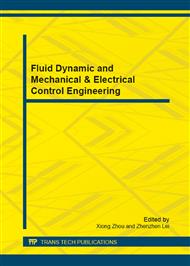p.3
p.7
p.11
p.17
p.24
p.28
p.35
p.39
Effect of Viscosity on the Separation Ability of a Hydrocyclone
Abstract:
On bases of numerical simulation and theoretical analysis, two cases of media, water and slurry (a kind of pseudoplastic power-law fluids), were used in the same hydrocyclone under the same operating condition. The Compare results show that the effect of the medium viscosity on the radial-velocity profile is slight; on the other hand, the effect of the media viscosity on the tangential-velocity profiles is important. The increase of the media viscosity produces not only the increase of the viscous resistance but also the steep reducing of the peak value of tangential-velocity profiles, which means that the inward viscous force loading upon the particles are enforced, on the other hand , the outward centrifugal force loading on the particles reduces greatly. The increase of the media viscosity leads to the great decrease of the separation ability of a hydrocyclone.
Info:
Periodical:
Pages:
7-10
DOI:
Citation:
Online since:
November 2012
Authors:
Price:
Сopyright:
© 2012 Trans Tech Publications Ltd. All Rights Reserved
Share:
Citation:


